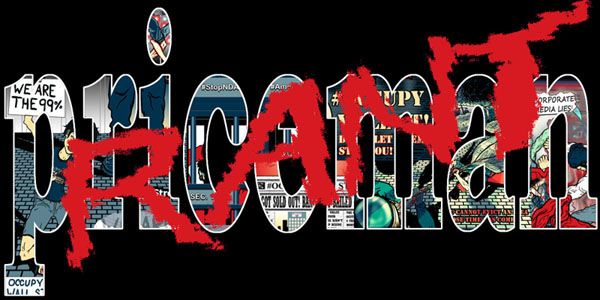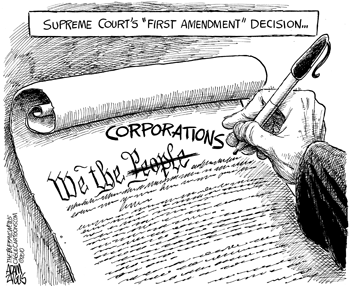Since the Supreme Court ruled in 2010 that corporations are people and protected under the First Amendment, the flood gates of private money from billionaires to shape the future of politics everywhere from Washington, DC to state and local local elections. Two of the biggest sources of this money are the Koch brothers, Charles and David, who have a combined wealth of $34 billion. The brothers are the founders of Americans for Prosperity that financed the ironically named, Tea Party. They initially denied their involvement but you can run but you can’t hide from some intrepid journalists determined to keeping the public informed.
As a matter of fact, they get quite upset about it when their attempts to manipulate the political stage are exposed, often sending nasty letters. MSNBC’s Rachel Maddow has been one of the most intrepid journalists who has dug into the vast network of Koch-funded groups and initiatives to show their influence on conservative politics, undeterred by nasty letters.
The Koch Party
By The Editorial Board of The New York Times
Only a few weeks into this midterm election year, the right-wing political zeppelin is fully inflated with secret cash and is firing malicious falsehoods at supporters of health care reform.
As Carl Hulse of The Times reported recently, Democrats have been staggered by a $20 million advertising blitz produced by Americans for Prosperity, the conservative advocacy group organized and financed by the Koch brothers, billionaire industrialists. The ads take aim at House and Senate candidates for re-election who have supported the health law, and blame them for the hyped-up problems with the law’s rollout that now seem to be the sole plank in this year’s Republican platform. [..]
In 2012, as The Washington Post reported, the Koch network raised $407 million, which was secreted among 17 groups with cryptic names and purposes that were designed to make it impossible to figure out the names of donors the Kochs worked with. As one tax expert told The Post, “it’s designed to make it opaque as to where the money is coming from and where the money is going.” [..]
The clandestine influence of the Kochs and their Palm Springs friends would be much reduced if they were forced to play in the sunshine.
The Internal Revenue Service and several lawmakers are beginning to step up their interest in preventing “social welfare” organizations and other tax-sheltered groups from being used as political conduits, but they have encountered the usual resistance from Republican lawmakers. Considering how effectively the Koch brothers are doing their job, it’s easy to see why.
Koch World 2014
By Kenneth P. Vogel, Politico
If the Koch brothers’ political operation seemed ambitious in 2010 or 2012, wait for what’s in store for 2014 and beyond.
The billionaire industrialists Charles and David Koch are convening some of the country’s richest Republican donors on Sunday at a resort near Palm Springs, Calif., to raise millions of dollars for efforts to shape the political landscape for years to come.
It’s the cash that can possibly kick Democrats out of the Senate majority this fall and shape the philosophy and agenda of the GOP conference – not to mention the 2016 presidential field.
The Koch political operation has become among the most dominant forces in American politics, rivaling even the official Republican Party in its ability to shape policy debates and elections. But it’s mostly taken a piecemeal approach, sticking to its sweet spots, while leaving other tasks to outsiders, or ad hoc coalitions of allies.
That’s changing. This year, the Kochs’ close allies are rolling out a new, more integrated approach to politics. That includes wading into Republican primaries for the first time to ensure their ideal candidates end up on the ticket, and also centralizing control of their network to limit headache-inducing freelancing by affiliated operatives.
The shift is best illustrated in the expansion of three pieces of the Koch political network expected to be showcased or represented at the three-day meeting in Palm Springs, whose evolving roles were described to POLITICO by several sources.
The Koch’s agenda to influence politics needs more than sunshine, it needs bleach.


 It has been four years since the Supreme Court handed down it ruling in
It has been four years since the Supreme Court handed down it ruling in
Recent Comments